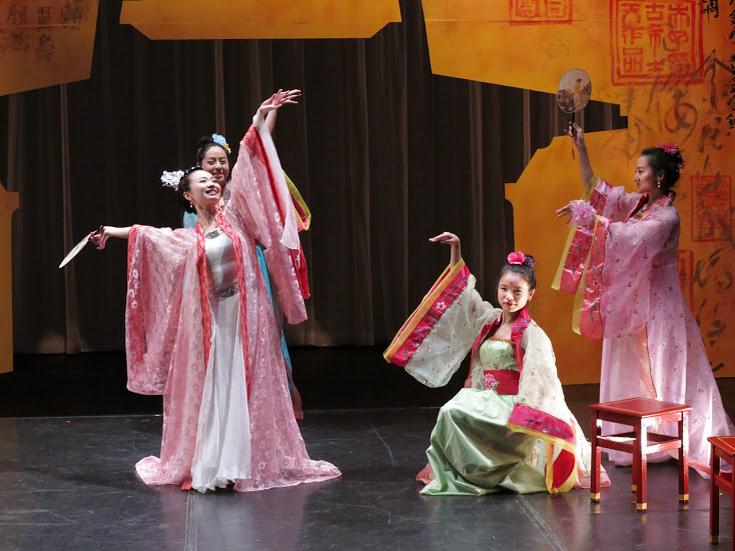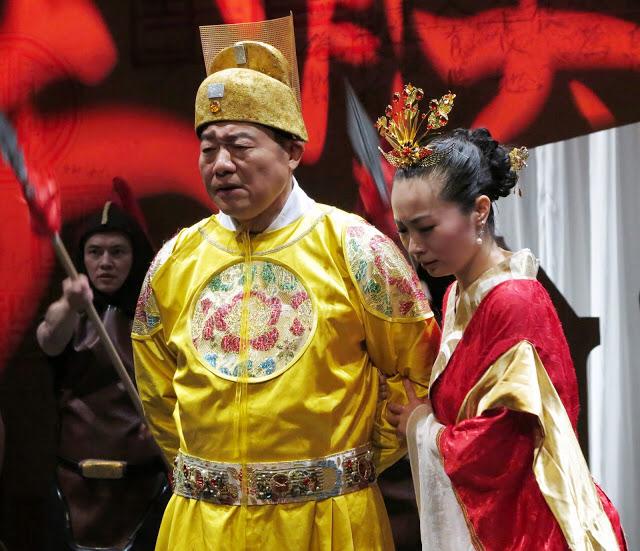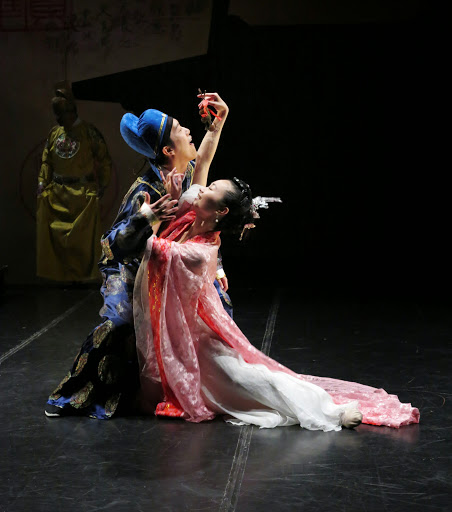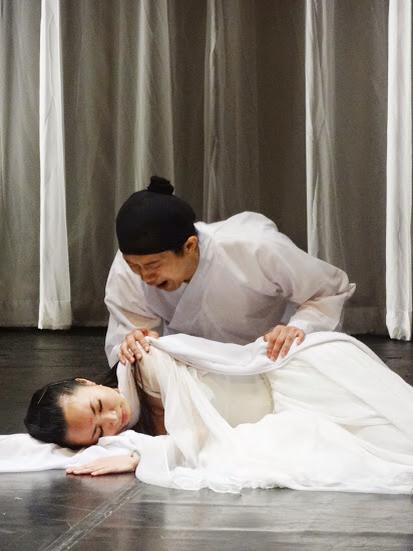Article by Xi Lu
Photo by Jonathan Slaff
Yu-Huan, the story of the House of Yang, has been an undiminished subject of literature and fine arts throughout thirteen centuries. Her death marked the end of 130 years of unprecedented prosperity in China’s Middle Kingdom and a golden age of artistic outpourings. Her life story is the subject of “The Story of Yu-Huan” by Joanna Chan is presented by Yangtze Repertory Theatre of America at Theater for the New City. One of New York’s most significant entry point for dramatic works from Chinese-speaking countries and a place of collaboration for artists from various parts of Asia on works by the co-founder Chan and others.
Chan’s own plays include the political and controversial drama, “The Soongs: By Dreams Betrayed,” which she directed for Yangtze’s 10th anniversary in 2003 before the Hong Kong production early this year. Her “One Family One Child One Door,” a black comedy on the human cost of China’s one-child policy, premiered in 2001, was revived twice and was a finalist in the Jane Chambers Playwriting Contest.
“The Story of Yu-Huan” is written by Chan in 1998, centers on a woman who was born of royal lineage during the Tang Dynasty and trained as an artist, as were other women of her station. She lived in an era when extraordinary women, cultured and literate, played dominant roles in public affairs. At 15, she married Prince Shou, a son of Emperor Xuan Zong who, at a chance encounter, fell in love with his daughter-in-law and took her for his own. Unlike many of the women in the royal circle, Yu-Huan harbored no personal ambition and was submissive to her fate. In the tumultuous and desperate hour of General An Lu-Shan’s rebellion, toward the end of the reign of Emperor Xuan Zong, she was made to bear the brunt of the people’s rage and ordered to take her own life.
This new version of Yu Huan’s story is performed in both English and Mandarin. In the Chinese tradition of playwriting, there is no psychological dialogue–the horror of the story is communicated in the facts of the play and in the characters’ actions. Throughout the play, Yu-Huan does not get to speak; her fate is hammered home as the decisions of her life are made for her.
The story tells about an age when, to maintain peace with warring ethnic groups (in today’s Tibet, Mongiolia, Manchuria and Xinjang). Warriors were recruited from the “outer” tribes (who were often of different skin colors and languages) to contain their own people. One warrior, An Lu-Shan, was made commander-in-chief of the city known today as Beijing. He stalks this play like a Cassius; his revolt of 755 A.D. brought on the rapid decline of the Tang Dynasty.
The play is shown as a backlog format, which means that the story starts by telling the audience what is going on from the end and then come back to the beginning and eventually concludes with end that appeared at the beginning and goes on. The multi-ethnic cast of 18 includes its choreographer, featured Zhang ChunZhi as Emperor Xuan Zong, who was a teacher in Shanghai, but now he has been a broadcaster and commentator in New York; Ashley Liang as Yu-Huan, who originally comes from Guangzhou, China, is a professional Chinese dancer. She is a President and Dance Teacher of Ashley Dance Center, and an Executive Board and Dance Chroegrapher of Yangtze Repertory Theater of America and won several prizes; Charles Pang as the Prince, who comes from Hong Kong and received his training at the American Musical and Dramatic Academy and perfomed several times in Hong Kong and New York; Michae Liu as the Prime Minister Zhang; Jeremy Rafal as the Tribal Soldier; Alexander Reed as the General An Lu Shan; Ricky Lin as YuHuan’scousin; Ava Cheung; Alison T.Chi and Lu Zhao as YuHuan’s three sisters as the main heroes. Therefore, the ethnic mix of this cast is: five caucasians, one African-American, two Filipinos, one Japanese Hawaiian and nine Chinese, five from mainland China, two from Taiwan and two from Hong Kong.
We especially enjoy the performance by the leading actress Ashley Liang as Yu-Huan, her dance move is superb and without much of dialog, we completely feel her emotions through her body language and facial expressions. Go see it before the play ends on June 22.
Written/directed by Joanna Chan
Choreography: Ashley Liang
Set: Edward Morris
Lighting: Christina Watanabe
Costumes: Harrison Xu HaoJian
Original score: XiRen Wang/Sam Su
For more: www.yangtze-rep-theatre.org






Leave a Reply